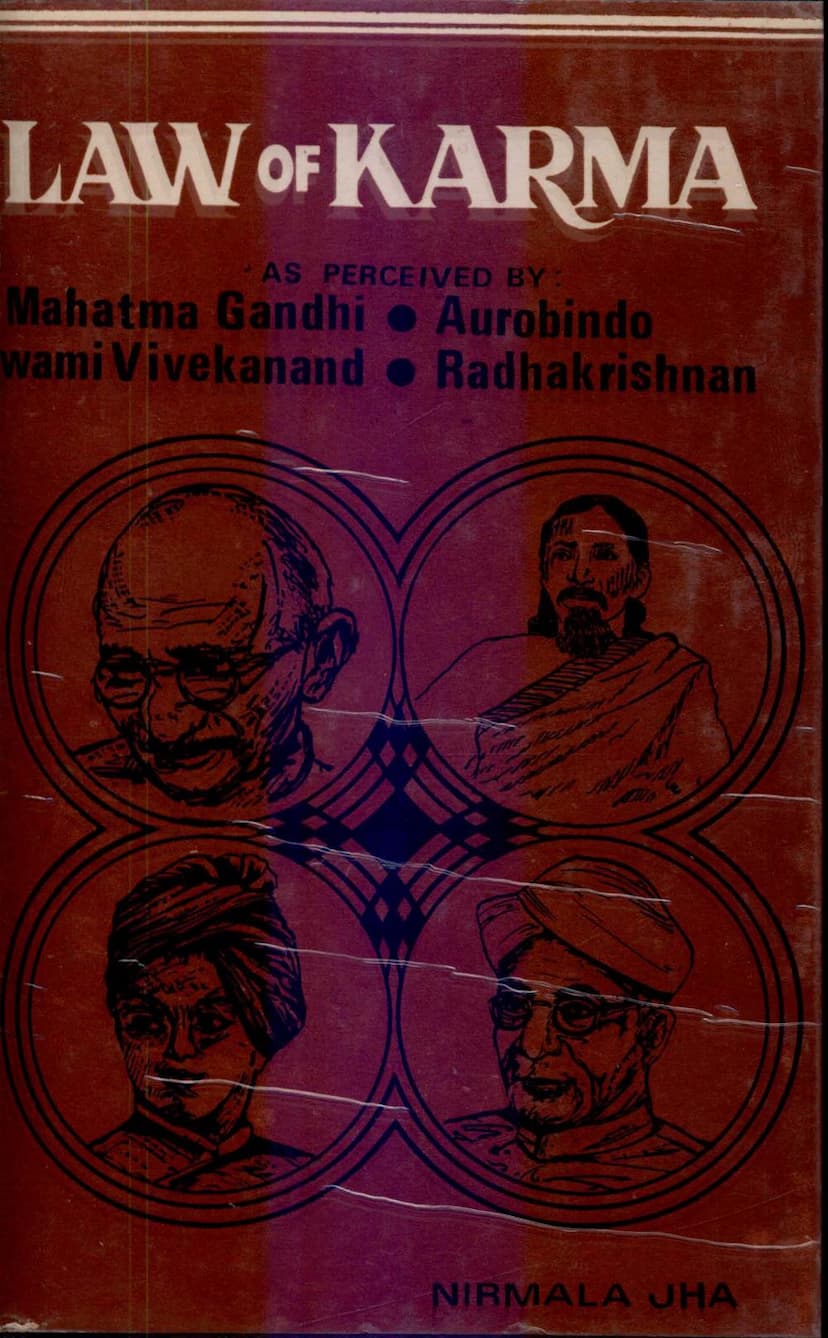Law Of Karma
Added to library: September 2, 2025

Summary
This book, "Law of Karma," by Nirmala Jha, published in 1985 by Capital Publishing House, Delhi, is a study of how prominent contemporary Indian thinkers — Sri Aurobindo, Swami Vivekananda, Mahatma Gandhi, and Dr. S. Radhakrishnan — perceived and interpreted the Law of Karma.
The author begins by establishing the Law of Karma as a foundational doctrine in ancient Indian philosophy, deeply influencing social actions and moral ideals. She notes that while the core concept remains, modern thinkers offered nuanced interpretations.
Here's a breakdown of each thinker's perspective as presented in the book:
-
Sri Aurobindo:
- Accepts the principle of "reaping what you sow."
- However, he doesn't see Karma as the sole determinant of the universe. For him, the soul is spiritual and drives its own evolution, with Karma being one of its processes.
- He emphasizes that not just actions, but also thoughts and feelings have consequences. Heredity and environment are also influenced by past and present actions.
- Aurobindo views Karma as a continuous chain, a causal association, but not purely mechanistic. There's a spirit or mind behind it, a conscious Being or Will guiding evolution. The soul is not a slave to Karma; it consents to its experiences.
- He distinguishes between psychic, spiritual, and material immortality, linking them to the soul's evolution through rebirth.
- Aurobindo reconciles Karma with freedom by defining freedom as self-determination, not chaos. He believes the true self or spirit enjoys absolute freedom, and even in the realm of appearance, choice is possible, albeit within natural laws.
- He posits that the ultimate goal is the manifestation of the spirit in material conditions, leading to material immortality.
-
Swami Vivekananda:
- Emphasizes that actions produce tendencies (samskaras) that shape future nature.
- Freedom, for him, is self-determination.
- He sees Karma as a principle that determines what we deserve and what we can become, making individuals responsible for their own destinies.
- Vivekananda connects Karma with reincarnation, seeing them as complementary. He interprets Karma as the accumulated experiences of past lives that shape our character.
- He stresses that man is the manifested form of the Infinite, and character is the aggregate of impressions from past lives.
- Vivekananda highlights that Karma is not a rigid, deterministic fate. Man has the power to shape his future through present actions. Freedom is self-determination, not the absence of determining factors.
- He champions Karma Yoga, emphasizing selfless work performed without attachment to the fruits, as a path to spiritual growth and freedom.
-
Mahatma Gandhi:
- Believes in both the moral and metaphysical aspects of Karma.
- He asserts that man is the maker of his own destiny, which fosters a sense of responsibility.
- Gandhi sees God as the ultimate reality, the Law-maker, Law, and Executor, and believes in the inexorable nature of the Law of Karma.
- For him, personal sufferings are due to past wrong actions, and right actions in this life will bear future fruits. He doesn't believe in luck or fate in an extraordinary sense.
- He links Karma to rebirth, interpreting it morally as a mechanism for self-development and adjustment in life. This belief provides strength and hope.
- Gandhi acknowledges limitations on free will due to past karma, but emphasizes the freedom to choose how to use the given circumstances and strive for good. He stresses the purity of means and the importance of self-restraint.
-
Dr. S. Radhakrishnan:
- Views the Law of Karma as a link between past, present, and future lives, where the present is an outcome of the past, and the future is shaped by the present.
- He maintains that man is free to act in the present, thus making his own destiny.
- Radhakrishnan sees Karma as a principle of continuity, where good actions lead to good and evil to evil, influencing character and future lives.
- He distinguishes between the retrospective aspect of Karma (connection to the past) and the prospective aspect (creative freedom).
- Radhakrishnan argues that freedom and Karma are not incompatible; freedom means self-determination. Man is determined by past karma but is free to create future karma through choices.
- He also connects Karma to rebirth, stating that rebirth is necessary for the soul to realize its distant goals and actualize its potential, which may not be possible in a single lifetime.
In conclusion, Jha's book presents a comprehensive overview of how these influential Indian thinkers interpreted the Law of Karma, highlighting their shared belief in its fundamental role in human existence while also showcasing their unique contributions to its understanding, particularly in relation to freedom, evolution, and the spiritual nature of humanity.